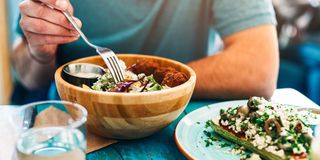Prime
Why you should practice sustainable eating

Dr Nanyonjo says growing personal food is the first step to sustainable eating. PHOTO | COURTESY
What you need to know:
- A sustainable diet focused on whole foods, seasonal and local ingredients, and minimally processed foods should increase overall nutritional capability.
What we put on our plates has a big impact on the environment. Eating more healthfully and more sustainably go hand-in-hand, meaning we can develop sustainable eating practices that improve our own health while also benefiting the health of the planet.
Dr Mary Jackie Nanyonjo, a nutritionist at Nsambya Hospital in Kampala, says sustainable eating, also known as sustainable nutrition refers to making food choices and dietary decisions that have a positive impact on the environment, society, and personal health.
The primary goal of sustainable eating is to minimise the negative environmental and social consequences of food production and consumption while promoting health and well-being.
Benefits
Dr Nanyonjo says growing personal food is the first step to sustainable eating.
“Having a garden in your backyard helps you grow healthy foods of your choice and saves you from additional costs. Also, these foods have less or no chemicals sprayed on them, reducing one’s risk of illnesses, especially those that come from overexposure to chemicals,” she says.
Whereas many of us prefer to buy foods that are highly processed such as canned beans, Dr Nanyonjo encourages one to eat more plant foods such as fresh beans, sweet potatoes as well as a lot of fruits and vegetables.
According to www.hsph.harvard.edu, the Healthy Eating Plate suggests filling half your plate with vegetables and fruits as part of an optimal diet, but planning our meals around produce benefits the planet as well. Shifting to a more plant-based way of eating will help reduce freshwater withdrawals and deforestation, a win-win for both our personal health and the environment
Additionally, eating unsaturated foods such as soy, coconut and almond milk, sunflower, coconut/ almond oil, help in improving the body’s blood circulation and reduces the risk of diseases such as cancer and diabetes, among others.
Choose whole grains
www.eufic.org states that non-refined cereals are generally less resource intensive to produce than refined ones as they require fewer processing steps. They are also good for health, reducing our risk of cardiovascular diseases, type 2 diabetes, and overweight.
For example, whole meal bread, whole grain pasta, unrefined barley, buckwheat and quinoa, are great choices. Brown rice is a good substitute for white rice, but it should be enjoyed in moderation, as a lot of water is used during its production.
Note
As people try to adopt to sustainable eating, they are faced with challenges or misconceptions that range from individual to health-social problems.
Individually, Dr Nanyonjo says, a person may suffer from emotional distress as a result of stopping to consume a certain foodstuff. For example, one may be advised to eat a vegetable burger instead of a meat one. However, this can be overcome by gradually changing the foodstuffs and eventually accepting the change.
Due to the differences in the body’s responses from different foods, some people may face nutritional deficiencies. For instance, while some people may be advised to reduce their meat consumption, they may face malnutrition as a result of low iron levels in the body.
Additionally, not knowing what to eat may cause a nutrient deficiency since one eats something that their body does not need. It is, thus, important to eliminate certain foods as advised by a professional, after a full body medical check-up.
Advice
For the different lifestyles and dietary preferences such as vegans, vegetarians and omnivores, one must gradually plan a change from either lifestyle.
“Remember that sustainable eating is a journey, which one can start by making small changes that align with their values and preferences. Make a diet plan that you will follow daily, by incorporating plant and animal foods on different days of the week. It is also important to have more sustainable choices,” Dr Nanyonjo says.
Dr Nanyonjo also encourages one to grow their own foods or identify markets that sell plant foods of preference.




